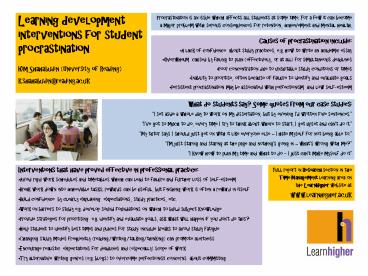Learning development interventions for student procrastination - PowerPoint PPT Presentation
1 / 1
Title:
Learning development interventions for student procrastination
Description:
Learning development interventions for student procrastination Kim Shahabudin (University of Reading) k.shahabudin_at_reading.ac.uk Procrastination is an issue which ... – PowerPoint PPT presentation
Number of Views:71
Avg rating:3.0/5.0
Title: Learning development interventions for student procrastination
1
Learning development interventions for student
procrastination Kim Shahabudin (University of
Reading) k.shahabudin_at_reading.ac.uk
Procrastination is an issue which affects all
students at some time. For a few it can become a
major problem with serious consequences for
retention, achievement and mental health.
- Causes of procrastination include
- A lack of confidence about study practices, e.g.
how to write an academic essay - Overwhelm caused by failing to plan
(effectively, or at all) for simultaneous
deadlines - Poor concentration due to unsuitable study
conditions or times - Inability to prioritise, often because of failure
to identify and evaluate goals - Persistent procrastination may be associated with
perfectionism and low self-esteem
What do students say? Some quotes from our case
studies I set aside a whole day to work on my
dissertation, but by evening Id written five
sentences. Ive got so much to do, every time I
try to think about where to start, I get upset
and cant do it. My tutor says I should just
get on with it like everyone else I hate myself
for not being able to. Im just staring and
staring at the page and nothings going in
whats wrong with me? I know how to plan my
time and what to do - I just cant make myself do
it
- Interventions that have proved effective in
professional practice - Avoid rigid work schedules and timetables which
can lead to failure and further loss of
self-esteem - Break work down into achievable tasks rewards
can be useful, but finishing work is often a
reward in itself - Build confidence by clearly explaining
expectations, study practices, etc. - Work on barriers to study e.g. develop sound
foundations on which to build subject knowledge - Provide strategies for prioritising e.g.
identify and evaluate goals, ask what will happen
if you dont do this? - Help student to identify best times and places
for study include breaks to avoid study fatigue - Changing study modes frequently
(reading/writing/talking/thinking) can promote
alertness - Encourage realistic expectations for deadlines
and (especially) scope of work - Try alternative writing genres (e.g. blogs) to
overcome perfectionist concerns about committing
Full report in Research section in the Time
Management learning area on the LearnHigher
website at www.learnhigher.ac.uk































